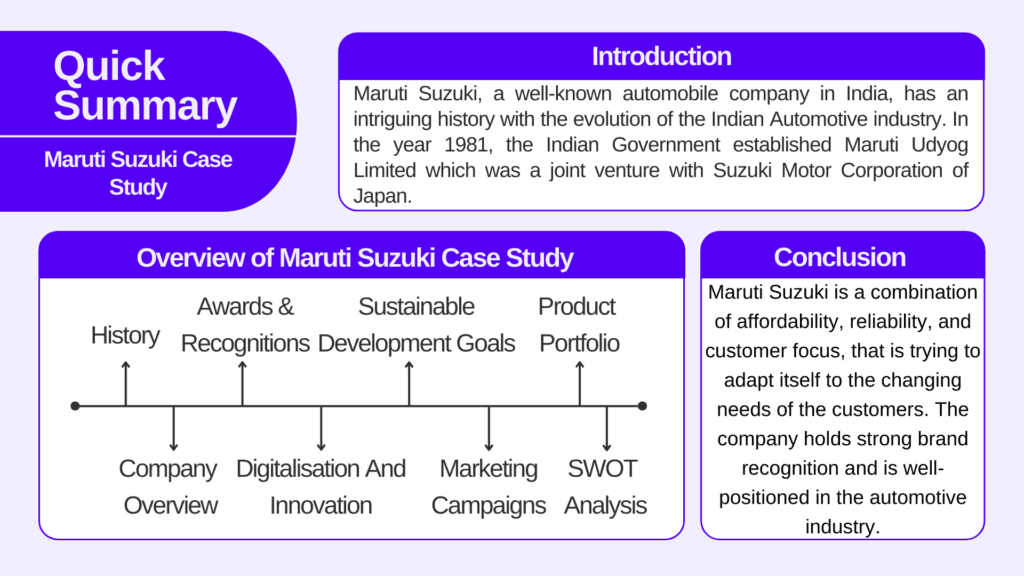| Type | Description | Contributor | Date |
|---|---|---|---|
| Post created | Pocketful Team | Dec-19-23 | |
| Content Update | Nisha | Mar-29-25 |

- Blog
- maruti suzuki case study
Maruti Suzuki Case Study: Business Model and Marketing Strategy


Maruti Suzuki, a well-known automobile company in India, has an intriguing history with the evolution of the Indian Automotive industry.
In this blog, let’s delve into the remarkable journey and explore the growth trajectory of Maruti Suzuki.

Maruti Suzuki – History
In the year 1981, the Indian Government established Maruti Udyog Limited which was a joint venture with Suzuki Motor Corporation of Japan.
The iconic Maruti 800, a fuel-efficient and affordable car, rolled off the production line, transforming the car industry in India in the year 1983. The Company then started expanding its basket by launching cars like Omni, Zen, and Wagon-R, to cater to the diverse car industry of the growing Indian market.
Maruti Suzuki – Company Overview
Maruti Suzuki India Limited is a subsidiary company of Suzuki Motor Corporation, Japan that currently holds almost 56% of the equity in the company. It is one of the largest car makers. The company manufactures and sells passenger vehicles in India and the largest exporter of passenger vehicles in India.
The top 5 export destinations are Chile, Ivory Coast, Saudi Arabia, Ethiopia, and South Africa.
As of March 2025, it is listed on the National Stock Exchange (NSE) and Bombay Stock Exchange (BSE) and trading around a price of INR 11,476.
The company has multiple production facilities across India and boasts a robust manufacturing capacity that exceeds 1.5 million units annually.
Market Information of Maruti Suzuki
| Current Market Price | ₹11,476 |
| Market Capitalization (in ₹ Crores) | 3,60,807 |
| 52 Week High | ₹13,680 |
| 52 Week Low | ₹10,725 |
| Dividend Yield | 1.07% |
| ROCE | 21.8% |
Read Also: Eicher Motors Case Study: Business Model & SWOT Analysis
Maruti Suzuki – Awards & Recognitions
- Maruti Suzuki Grand Vitara was awarded Car of the Year – Autocar Awards 2023
- The company has also been awarded the Global Safety Summit Award for CSR.
- In 2024, Maruti Suzuki manufactured 2 million vehicles in a calendar year.
The company believes in a value-creation approach and connects well with the customers to understand their needs.
The company has two manufacturing units in Haryana and one manufacturing unit in Gujarat. The important raw materials for the company are steel coils, non-ferrous castings, and paints.
Maruti Suzuki pursues a multi-channel strategy. One of its fundamental elements of value creation is ‘optimum resource utilisation’. The Company has inculcated the 3R principle, Japanese practices, and SMC’s basic philosophy of ‘Fewer, Smaller, Lighter, Neater and Shorter’ across all its operating practices.
The core values of the company include customer obsession, flexibility and first mover, innovation and creativity, openness and learning, networking, and partnership.
With a major focus on optimum resource utilization and operational excellence, the company adopts Japanese practices for efficient operations. Maruti Suzuki offers the best products and car services in India by leveraging the unique ability of Suzuki Motor Corporation and designing environment-friendly and safe products.
Striving to provide the best value proposition to the customers, the company extracts raw materials and sends them to raw material processing units. These units further provide units to Tier 1, 2 & 3 suppliers. Once the manufacturing process is completed, the cars are then finally supplied to the dealers.
The Company uses the IMDS tool to measure the ‘RRR’ performance in 16 models and has collaborated with Toyota Tsusho Group and established a joint venture named Maruti Suzuki Toyotsu India Private Limited (MSTI) for vehicle dismantling and recycling facilities in India.
Apart from this, the company emphasizes low-cost production with the help of local sourcing and efficient supply chain management to keep costs down, and provides engines that are fuel-efficient and have minimalistic features.
Digitalisation and Innovation
The company launched the Maruti Suzuki Smart Finance service to make the buying procedure easy for its customers. This is an online car finance facility.
To manage the risks arising from natural disasters, Maruti Suzuki maintains close communication with suppliers of all tiers and optimizes the use of semiconductors in electronic components.
Some of the innovation programs are listed below:
- Nurture 2023 was launched in partnership with IIM Calcutta.
- Incubation 2020 in partnership with IIM Bangalore.
- MAIL 2019 in partnership with GHV Accelerator.
Sustainable Development Goals
The company incorporates several sustainable development goals in its business model:
- The company focuses on producing fuel-efficient cars that reduce carbon emissions and conserve energy.
- Initiatives have been taken by the company to promote road safety.
- Various welfare measures are taken to support and encourage female employees.
- They work and collaborate to improve traffic and congestion in urban areas to make the cities liveable.
- The company implements measures to reduce water and energy consumption in its production processes. About 3,443 million litres of water was recycled by the company in 2024. Furthermore, the company doesn’t use groundwater and meets 64% of its water requirements through water recycling.
- The company invests in research and development, as well as skilling and training the employees. Over 12,000 students benefitted through various skill development programmes launched by the company.
Read Also: Tata Motors vs Maruti Suzuki? Analysis of Auto Stocks
Marketing Campaigns of Maruti Suzuki
Over the years, Maruti has consistently launched remarkable and memorable campaigns that resonated with Indian audiences. The most famous ones are mentioned below:
1. Kitna Deti Hai? – this 80’s campaign with an iconic and unique slogan focuses on fuel efficiency.
2. Maruti Udyog: Bandhan Apna Sath Ka – launched in the 90’s, this emotional slogan reached and touched the hearts of millions of customers.
3. More marketing campaigns include Living Life Zestfully (2010s), Desh ki Shaan, and Ghar ki Naaz (2020s).
Product Portfolio
The company’s products include
- Maruti Suzuki ARENA will provide a social and connected car experience to its customers. For example: Brezza, Ertiga, Swift, etc.
- NEXA – A premium sales channel to provide its customers with a rich retail experience through innovations and technology. For example: Fronx, Grand Vitara, Jimny, etc.
- Commercial Vehicles to cater to the needs of retail channels.
And the OG Maruti 800!
SWOT Analysis of Maruti Suzuki
Strengths
- Strong brand recognition with a market share of 40% in the automotive industry of India.
- Wide distribution network of over 3000 dealerships across India.
- Customer-centric approach to provide affordability and easy services.
- A diverse range of products that covers various segments.
Weakness
- It relies heavily on the Indian market for revenue generation, making itself vulnerable to economic fluctuations.
- Lack of presence in the premium car segment.
- The Automobile industry is a cyclic industry.
Opportunities
- The growing demand for EVs can be an opportunity for the company to expand its business operations across India.
- Forming strategic alliances with technology companies or other automakers for research and development for market expansion.
- Focusing on rural market penetration can help Maruti grow.
Threats
- Increased competition in the car market with established brands can pose a threat to the company.
- It’s difficult to align with changing customer needs and preferences towards SUVs and EVs.
- Any kind of disruption in the global supply chain can be a threat to the company.
Key Performance Indicators
| Particulars | March 2024 | March 2023 | March 2022 |
|---|---|---|---|
| Operating Margin (%) | 12.24 | 8.78 | 5.27 |
| Net Profit Margin (%) | 9.32 | 6.83 | 4.20 |
| ROE (%) | 15.75 | 13.28 | 7.01 |
| ROCE (%) | 19.42 | 16.02 | 8.08 |
| Current Ratio | 0.87 | 0.58 | 0.99 |
| Debt to Equity Ratio | 0 | 0 | 0.01 |
Future Outlook
Maruti Suzuki, India’s leading automaker, is set for significant expansion by 2030. The company plans to double its production capacity to 4 million vehicles annually, investing approximately $5.5 billion. This expansion includes establishing a third plant in Kharkhoda, Haryana, aiming for a production capacity of 4 million vehicles by 2031. Maruti also targets increasing its domestic market share to 50% and boosting exports, with plans to manufacture 1 million units for export by 2030. The company is venturing into the electric vehicle market, preparing to launch its first EV, the e Vitara SUV, in 2025. Suzuki Motor Corporation, Maruti’s parent company, has earmarked $13 billion in investments through 2030, with 60% allocated to India, underscoring the country’s strategic importance in its global operations. Collectively, these initiatives position Maruti Suzuki for robust growth and a strengthened market presence in the coming years.
Read Also: Varun Beverages Case Study: Business Model, Financials, and SWOT Analysis
Conclusion
Maruti Suzuki is a combination of affordability, reliability, and customer focus, that tries to adapt itself to the changing needs of its customers. The company holds strong brand recognition and is well-positioned in the automotive industry. Its CSR and sustainability initiatives sets it apart from its competitors. However, it is advised to consult a financial advisor before investing.
Frequently Asked Questions (FAQs)
When was Maruti Suzuki established?
Maruti Suzuki was established in the year 1981.
Which is the most sold car by Maruti?
The most sold car is the Maruti 800.
Maruti Suzuki is the subsidiary of which company?
Maruti Suzuki is a subsidiary company of Suzuki Motor Corporation, Japan.
What is Nexa by Maruti Suzuki?
Nexa is a premium sales channel to provides customers with a rich retail experience through innovations and technology.
Is Maruti Suzuki a listed company?
Yes, Maruti Suzuki is a listed company.
Disclaimer
The securities, funds, and strategies discussed in this blog are provided for informational purposes only. They do not represent endorsements or recommendations. Investors should conduct their own research and seek professional advice before making any investment decisions.